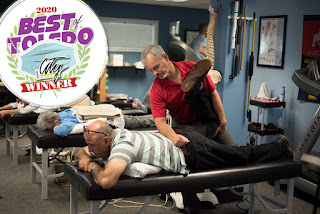What Do You Know About Physical Therapy?
Physical therapy is now a booming business that has come a very long way in a very short period of time; in fact, it's one of the fastest-growing industries in the world. New physical therapists are entering the field every single day to treat the ever-growing pool of people requiring treatment for all different kinds of injuries and ailments.
Injuries are a
fact of life, not just for professional athletes but for regular people too. An
elderly person who slips in the shower and breaks a hip, or the dockworker that
injures his back lifting
heavy box after heavy box or the middle-aged woman that gets banged up
in a hit and run collision all require the services of a properly trained physical
therapist.
Where are Physical Therapists Employed?
The answer to this question could go on and on - Professional, amateur, and college
sports teams often employ their own physical therapists. Hospitals, free
clinics, and nursing homes may also have one or more physical therapists
on staff.
Specialists in sports therapy, specific types of injuries, or bariatric
care may operate their own office and see several patients from varying
backgrounds a week.
There is a multitude
of different specialties and paths that are available within the wide field of
physical therapy, and that means that there is an ever-widening
array of physical therapy equipment and physical therapy supplies available, so
that every general and every specialized
physical therapist can have everything that he or she needs to be able to
properly treat
the injury of what ever-patient happens to walk through the door next.
Tools of the Trade
Sports therapists use probably the widest variety
of physical therapy supplies to deal with everything that they may encounter on
a daily basis. A sports therapist needs to be prepared
to handle everything from the minor aches and pains that their athletes incur on
the field every single day, but they also need to be prepared to deal with the rehabilitation
of serious injuries that require surgeries and sometimes months of treatments
to heal.
A large sports therapy treatment center will often
almost appear to be overrun with equipment. There could be a fully stocked hydrotherapy section
with standing and seated whirlpools; mobility stations complete with parallel
bars, standers, and stair training equipment;
and most will also have a full array of massage therapy equipment with a
massage table and chairs as well as a variety of creams, oils and other massage
therapy supplies. Many specialized
physical therapists today are also certified in one or more types of massage
therapy as well.
Depending on the particular
area of specialty, a physical therapy clinic may even have a variety of x-ray
and imaging equipment available as well as a full array of chiropractic
supplies and massage therapy
equipment so they can be as full service
as possible to their potential clients.
Regardless
of the avenue of specialty a physical therapist chooses, he or she will surely
need a wide variety of equipment to be able to perform
the job to the best of his or her abilities.
Getting the best result possible from a physical therapy session, whether
it's just to work on a strained muscle or rehabilitation
from major surgery, requires not only an adept therapist but also the best
possible equipment for the method of treatment. That's why there are so many
options available
and why new and better ones are being developed and implemented
every day. Physical therapy is a very involved and precise trade, one where
perfection is an absolute must in order for the correct outcome to be achieved
- so for as long as the trade of physical therapy continues to be a booming
one, most likely so will the development of new pieces of physical therapy equipment.


Comments
Post a Comment